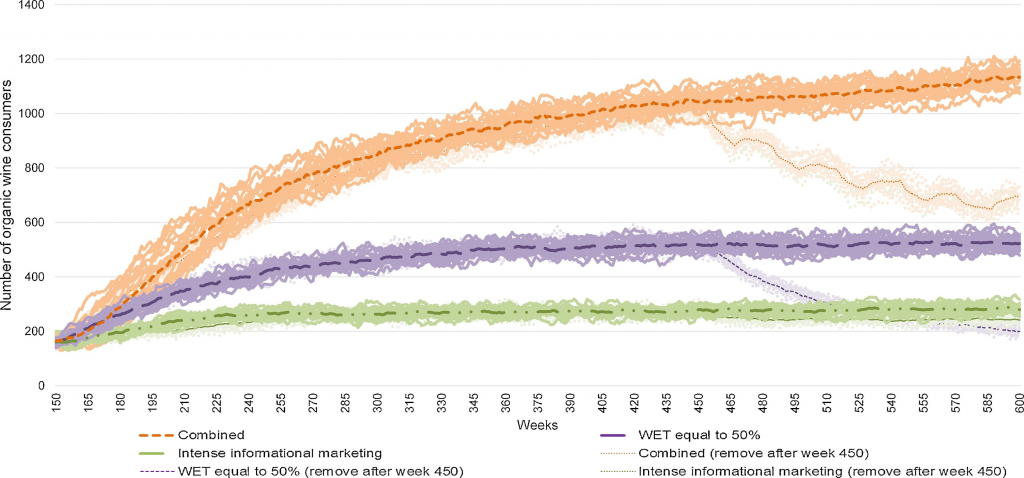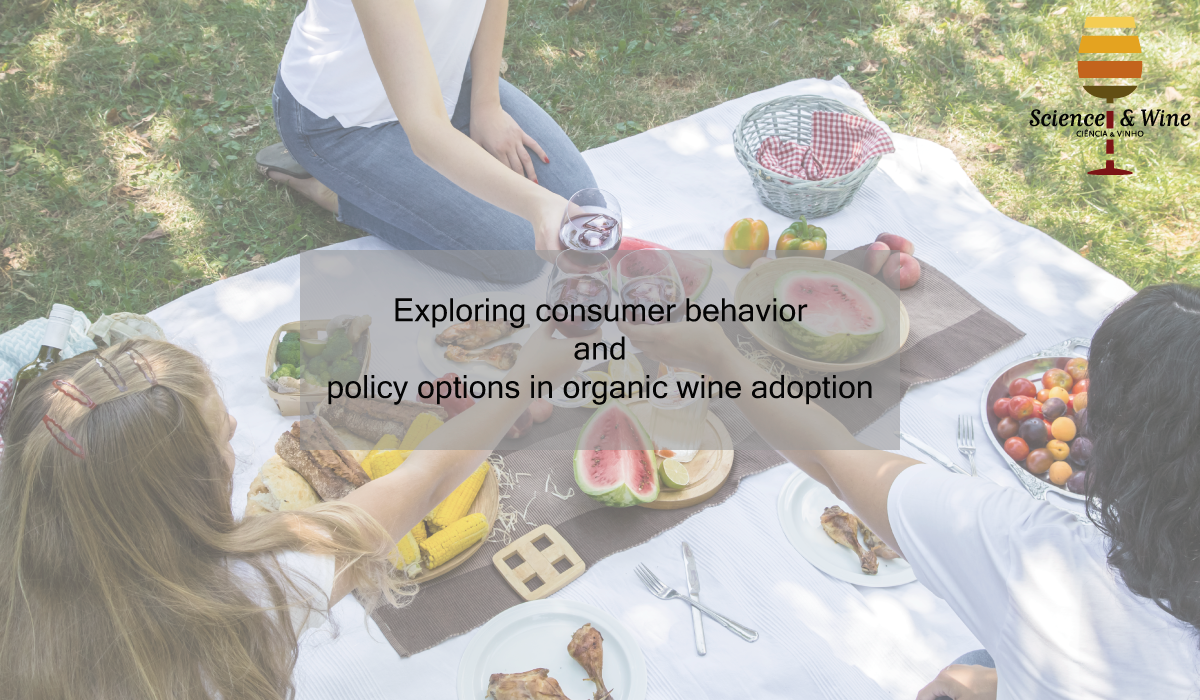By Firouzeh Taghikhah, Alexey Voinov, Nagesh Shukla, Tatiana Filatova
There is growing public concern about the environmental consequences of wine production. The issues are mainly related to water quality and scarcity, land-use change, and greenhouse gas emissions. The wine industry has already engaged in climate change adaptation but there is not much that is done in terms of reducing the environmental impacts of production. Perhaps the only real environmentally friendly strategy in wine production can be expected from a larger adoption of organic wineries. Those, in turn have been mostly seen as decisions by the farmers or wine producers. The role of the adaptive purchasing behavior of wine consumers is yet to be investigated. When purchasing wine, consumers look for attributes such as the country and region of origin, grape variety, price, and brand. In addition to these traditional wine attributes, sustainability labels and cues add to the complexity of consumer choices. While the bulk of literature on wine consumers focuses on studying purchase behaviors, there is not much research on drivers related to sustainability. We address this gap by developing a computational model to simulate the decision-making process and explore the key stimuli that lead people to make choices between organic and non-organic wines in the complex shopping environment.
We believe that the role of consumers and their preferences is an important factor in shaping the transition to a sustainable food supply chain. The extended supply chain framework highlights the significance of raising consumer awareness and motivating behavioral shifts for reducing the environmental impacts of food production (Taghikhah et al., 2019).
Empirical research on organic food preferences, so far, could not provide a clear understanding of the extent of interventions that can influence the behavior of consumers. In many cases, running an experiment requires much time, and effort before reaching the desired results, if reaching them at all. These limitations emphasize the need for methods that complement the empirical information about the complex behavior of organic consumers. System models can improve our understanding of the complexity of food purchasing decisions. Models are useful for designing interventions, comparing policy options, testing theories, and scaling behavioral patterns observed in experimental and field data. Simulation methods such as agent-based modeling (ABM) add value by exploring causal connections behind system-level phenomena and patterns. ABMs not only study macro-level patterns emerging from actions of heterogeneous agents and their interactions with each other but also show the downward causation where the behavior of individuals at the micro-level is influenced by collective actions. This makes ABM a suitable method for studying the complexity of cumulative market effects of individual behavior changes, especially in food preferences, where emerging social norms add uncertainty about future consumption choices.

ORganic Vine (ORVin) model explores the demand side of the organic food market and quantifies the cumulative impacts of behavioral changes among heterogeneous consumers, prone to behavioral biases and social interactions. It offers a unique opportunity to combine various social theories – the Theory of Planned Behavior (TPB) along with the Alphabet Theory and the Goal Framing Theory – to understand the process of organic wine purchasing. We can explore the dynamics of purchasing decisions in different situations (i.e., shopping environment, house, etc.), understand the influence of context on the action, identify potentials for influencing the preferences, and bridge the gap between intention and behavior. By applying theories that focus on changing behavior (e.g., goal framing theory) in conjunction with theories that emphasize explaining the decision-making process (e.g., TPB), we can improve our understanding of how customer behavior is formed. We explicitly trace the effects of social interactions, drinking habits, and desirability factors on wine preferences. Regardless of its taste, wine is greatly associated with festivity, fraternity, social norm, and rarely consumed alone. Previously, social norms have not been considered as a factor for wine choices, yet they strongly influence how consumers choose organic products. ORVin helps to understand how to persuade consumers to make healthier choices when dealing with vice products such as wine. Since organic wine is hardly perceived to be of higher quality than conventional wine, it is considered as an exception to the subjective norm.
Using ORVin, we explore the role of different policy interventions such as taxation and public awareness campaigns in promoting the demand for organic wine. A combined market and information-based policy is more effective in promoting organic wine preference than applying these policies separately. This non-additive effect of policies is an emergent property in this system. The results highlight that:

- Behavioral shifts occur when the social pressure for purchasing conventional wine reduces. This phenomenon is caused by co-dependent behaviors, where individual behavior is amplified by its social environment. We see the more people change, the stronger the social pressure on other people to change as well.
- A cascade of behavior changes for purchasing organic wine is triggered when passing the 35% tipping point, which can be achieved only by combining various policies. This radical change does not occur even if more than a third of the population adopt organic wine in response to separate interventions.
- Conformity rather than social learning plays the dominant role in purchasing contagious products, including wine. As organic wine purchasing behavior gains more visibility, it is more likely to gain social approval. The existing norm for conventional wine purchasing in a vicious cycle can shift to organic wine purchasing in a virtuous cycle and get reinforced.
Our findings are important for increasing the adoption of organic vice products where the willingness to pay is profoundly lower than for virtue products, even with the same price premiums. Organic vice products suffer from negative quality inferences, which can be reduced in social consumption situations/environments. Therefore, if the concerns for public self-image and norm conformance representing undercover altruism are alleviated, the number of organic vice consumers is expected to surge. While big supermarkets and food companies push for launching alternative organic food products, the small market size, and low willingness to pay for them hamper their prosperity. To successfully promote organic vice product lines, a combination of price promotion and normative cues can create major change. Price promotions are effective in attracting new consumers. Cues promoting organic purchasing as a common norm manipulate people’s anticipation about possible reactions of others (conventional consumers) and allow them to make a moral choice. This research provides useful insights for policymakers on how to provide additional support for organic farmers by changing consumers’ expectations about the wine choice of others.
See all at: Taghikhah, F., Voinov, A., Shukla, N. and Filatova, T., 2020. Exploring consumer behavior and policy options in organic food adoption: Insights from the Australian wine sector. Environmental Science & Policy, 109, pp.116-124.
PERSWADE – Wise transitions through IT
The goal of the Centre is to develop and apply persuasive technologies and system science for social innovation that can help humanity to move toward sustainable, wise, adaptive living. We realise that our well-being and prosperity are very much dependent upon the Earth life-support system. In many cases, by simply changing our behaviour we can achieve more than all the technological progress can bring us.

Firouzeh Taghikhah 
Alexey Voinov 
Nagesh Shukla 

Tatiana Filatova 
Firouzeh Taghikhah is a PhD student from PERSWADE center, at the School of Information, Systems and Modeling at Faculty of Engineering and IT, University of Technology Sydney. Her main research interests are in the areas of sustainable development, socio-environmental systems, and behavioral science using complex systems methods and operational research. In her thesis, she has developed an integral model to explore the transition pathways towards sustainable agro-food systems focusing on consumer behavior change.
Alexey Voinov, Distinguished Professor at the School of Information, Systems and Modeling at Faculty of Engineering and IT, University of Technology Sydney. He is director of the faculty Center on Persuasive Systems for Wise Adaptive Living (PERSWADE). Alexey’s main interest is in socio-environmental modeling of various systems, primarily using integrated and participatory modeling to explore complex societal issues. He believes that consumer preferences and behavior can be a key factor in our progress toward more sustainable living. He wrote a book on “Systems Science and Modeling for Ecological Economics” (Academic Press/Elsevier).
Nagesh Shukla is a senior lecturer at the School of Information, Systems and Modeling at Faculty of Engineering and IT, University of Technology Sydney. He is working in the area of business data analytics and optimisation (including Supply Chain and Healthcare). Nagesh has published in the areas of healthcare modelling, business analytics and optimisation, supply chain management and logistics, and stochastic simulation modelling techniques. His research focuses on the development of: (i) models that deal with making complex business processes efficient and effective; (ii) analytical models for system level optimisation and decision making; and (iii) data driven algorithms for decision making.
Tatiana Filatova is Professor of Computational Economic Modeling at the School of Information, Systems and Modeling at Faculty of Engineering and IT, University of Technology Sydney and University of Twente in the Netherlands. Her research line pioneered in integrating adaptive economic behavior in environmental simulation models, in particular urban and regional models. Most of Tatiana’s recent projects focus on cities and adaptation to climate change, with an interest on how socioeconomic impacts of disasters are distributed and how resilience emerges across scales.


The definition of ‘organic’ wine in the US (my country) has all but removed any ‘environmental’ consciousness from the equation. Organic wine in the US has no added sulfur dioxide and is often difficult to age gracefully and rarely can be compared to a wine with added sulfites. We can use ‘organically grown’ as a way to convey and dedication to cleaner, greener practices.